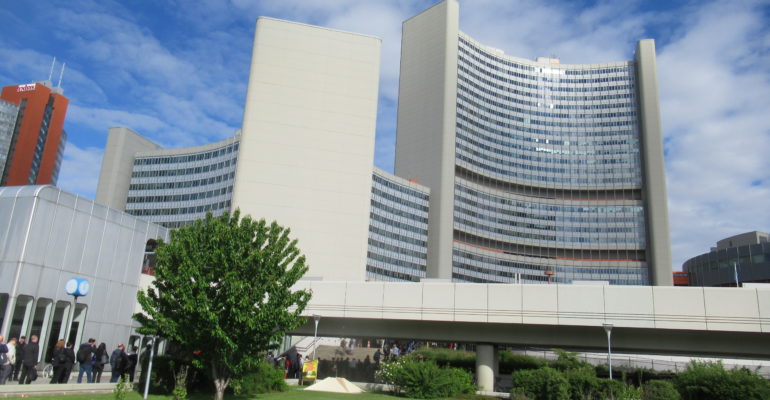A blog by Dora Vrdlovec, SI Club Wien Belvedere, Vienna
“The 28th Session of the Commission on Crime Prevention and Criminal Justice (CCPCJ) met 20 -24 May at the United Nations (UN), Vienna, to discuss “the responsibility of effective, fair, humane and accountable criminal justice systems in preventing and countering crime motivated by intolerance or discrimination of any kind”.
Previously, the UN Secretary-General, António Guterres, has underlined the need for the UN to focus on engaging societies in putting an end to the rise of hate speech, xenophobia and intolerance. Urging a global plan of action against hate speech and hate crimes, he said “hate speech and hate crimes are direct threats to human rights, sustainable development and peace and security”. In his video message to the CCPCJ, he said “I am convinced that by working together, we can reject hate, protect our communities against this threat and uphold our shared values. We all have a part to play in fostering a better world for all”
In more than 100 side events, Member States and NGOs presented the issues of hate crimes; prevention and countering of child sexual exploitation online; cyber-crime and terrorism; smuggling of cultural property and commercial goods.

Soroptimist International, with the Government of Mexico, held the side event: Misogynistic Hate Crimes. The panel consisted of: Dubravka Simonovic, UN Special rapporteur on violence against woman, its causes and consequences; Valerie Labeaux, Chief Justice Section, UNited Nations Office on Drugs and Crime (UNODC); Henrike Landré, Platform FEMICIDE WATCH; Linda Witong, prosecutor, SI Special Advisor to Advocacy; and Marion Prechtl, SI Representative to the UN Vienna, who gave the opening remarks.
H.E. the Ambassador of Mexico, as moderator, opened the panel and posed some questions to be considered: Why is (gender related killing, intimate partner killing) increasing? Can we categorise it as a social problem as it is present in so many countries? What is the role of the family and what is the role of institutions?
Linda Witong underlined the importance of the rule of law. Presenting examples and cases she has being collecting during her own work as prosecutor in California, delivered not only facts and data, but also measure of prevention and information. Her description of cases and the kinds of violence women and girls face had a great impact on the audience. In giving voice to the many abused women and girls she stressed the importance of having prevention, urban crime prevention, accountability and secure punishment of the perpetrators. Her speech was so instructive, concrete, down to the point (she numbered examples of honour killing, breast ironing, FGM, child brides, assault with acid, rape, women or girls’ wombs used to disguise bombs, all kind of atrocities). Hate crime, and in particular femicide, show that misogyny and domestic violence are two interconnected issues.
Linda gained a lot of consensus by the numerous audiences. There were many questions put to her from the floor on the role of custom, tradition and diversity between cultures, which showed an emerging issue that needs to be considered: the overlapping between hate crimes and terrorist offences with the instrumental use of women and young girls. The priority of our time is to put an end to the rise of hate speech. Hate speech varies among countries and time, it includes race, colour, religion, ethnicity and national origin, sexual identity, disability, and gender. At the end of the chain of hate speeches there is violence! Linda Witong showed it concretely giving examples and cases. Linda’s speech was a very good work of advocacy!
Linda’s speech fitted very well with the ones given by UNODC officer, Valerie Labeaux and by Dubravska Simonovic, UN special Rapporteur on violence against women motivated by gender hate, who pointed out that the word ”femicide” has only existed for 25 years. It is difficult to speak of hate crime when in many countries there is not a proper legislation in place.
Henrike Landrè presented the global platform on gender-related killing of women and girls, Femicide Watch, http://femicide-watch. This is a global digital space for official data, facts, interactive maps, best practices, landmark documents, research and latest news. The editorial team produces its own dossiers and reading lists. “Women who have the courage to speak up must be listened to, supported and not be re-victimized by a gender-blind system not fully ready for social change,” she said, “There is an urgent need to design, adopt and enforce laws and policies combating and preventing violence against women. Data on femicide should be better connected. There should be better researched on why, where and which measures have been taken; in other words a need for quantitative and qualitative data”.
The panellists strongly recommended empowering women at national and international levels; they urged for the culture of silence around gender-based violence to be tackled, to enable victims and witnesses to speak up and report such violence to appropriate national and international mechanisms.”

